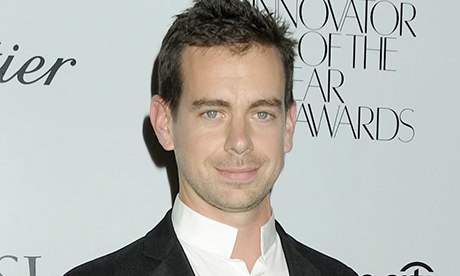If you think the social media company's stockmarket flotation is an advert for starting your own hi-tech company, just look at what happened to the founders

Twitter founder Jack Dorsey. Photograph: Rex Features
Every time a Silicon Valley name goes to Wall Street and raises billions, you hear a creation myth. You heard it again last Thursday, as Twitter floated on the stock exchange.
It comes in many flavours, but the ur-myth runs thus: a young man with more ideas than dollars hides in his parents' garage, has a eureka moment and devises some new gadget or program that changes the world – or at least distracts swaths of its population. Then comes the glorious denouement, where our startup hero goes to the stock market and cashes in big. And that, dear reader, is why we have Bill Microsoft, Mark Facebook, and Larry and Sergey Google. The end.
This is capitalism's version of The X Factor.
In the X-Factor economies of Britain and America, you may no longer be able to count on a decent job, affordable home or moderate pension, but still you are offered visions of outlandish success – whether in singing (for the glamorous) or business (for the rest of us). Doctoral theses will some day be written on how, as the arteries of social mobility hardened, the BBC served up ever more versions of the minted entrepreneur: Dragons' Den, Gerry Robinson, The Apprentice. The assumptions are easy to tease out: collective bargaining may be dead, but heroic labour can still earn the individual a string of zeroes.
The story of Twitter, as told over the past few days, snaps perfectly into this bigger jigsaw. A band of T-shirted young men (tick), coding in a flat (tick), come up with a crazy new software application (tick), which soon becomes a global phenomenon. Within seven years is floated on the stock market at a value of $34.7bn – more than most of the companies in the S&P 500. Cue details about how the founders are now paper billionaires, the employees are sitting on options that will make some of them millionaires, and the entire San Francisco HQ celebrated with an "overflowing tower of doughnuts" (tick, tick, tick).
Except the more you look at what has actually happened with Twitter, the more it comes to look like the opposite of the heroic earnings of a few hard-workers. Many of the billions will go to a select group, many of whom have put hardly any work into the company or taken comparatively little risk. That is true of the stock market flotation, of Twitter itself and of its entire business model.
Let's start with what happened last Thursday, when Twitter went to the stock market. On the first day of trading, the company's shares soared 73% – implying that they had been sold for over a billion dollars below what they could have got. By way of comparison, shares in Royal Mail jumped over 40% on opening, forcing Vince Cable to do some explaining.
Yawning gaps between offer price and true value are hardly unusual in flotations: they're often referred to as "leaving cash on the table" – the cash being for the investment banks managing the sale and their mates at other banks and funds who buy some of the shares. If an estate agent asked you to sell your house for £100,000 less than it was really worth, so that they could offer it around their mates in the building trade, you'd probably be straight on the phone to Watchdog. Yet when it comes to flotations, I am still waiting for the BBC report that notes how much the bankers scooped alongside the founders.
Let's also look at the company's story. I spent my weekend reading Hatching Twitter, by Nick Bilton, a biography of the business based on hundreds of hours of interviews with key participants. One of Bilton's achievements is to show how the credit for the idea can be split several ways. First, Jack Dorsey floated the notion of updating friends on one's whereabouts, while Noah Glass championed it and gave the application its name, then Biz Stone was asked to help with building the program by a still-reluctant Evan Williams. Yahoo! tells the minnow team that it's "simply just a messaging service" and a "few engineers could do the same thing in a week".
Look at which of the Twitter team did best from the flotation and the answer is: Evan Williams, who, in Bilton's telling, initially had least to do with the program, and Jack Dorsey. Those two are now worth over a billion dollars apiece. But the other members of the fab four are not even listed as major recipients of company stock. Who is? Typically, finance guys who took big stakes in the business when they could see how it might pay off.
And none of the founders are now anywhere near managing the company: within a few years of it getting off the ground, they'd all been cleared out for managers from big business. I'm not playing a violin for the four founders; but Twitter is hardly an advertisement for the rewards of starting up your own company.
Finally, look at Twitter's business. Or rather, look at its own assessment of its business, as stated in its S-1 stockmarket filing. Early on comes the delicious admission: "Our success depends on our ability to provide users of our products and services with valuable content, which in turn depends on the content contributed by our users." Read that again: Twitter is in the business of selling us to us – our news and views and idle banter. Without those, without us, it is nothing. As with Facebook and Tumblr and all the other social media, we're also part of Twitter's workforce. But I bet you haven't seen any stock options, either.
